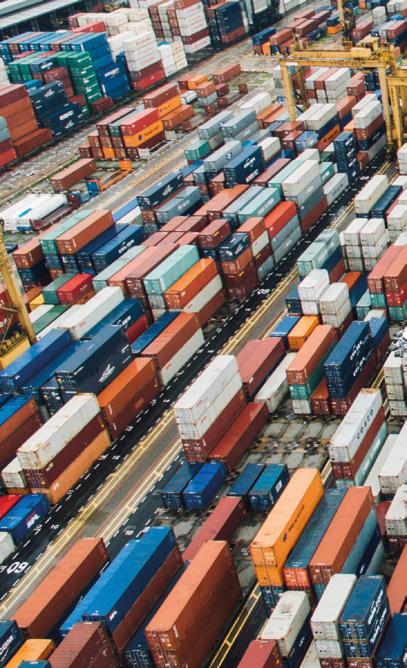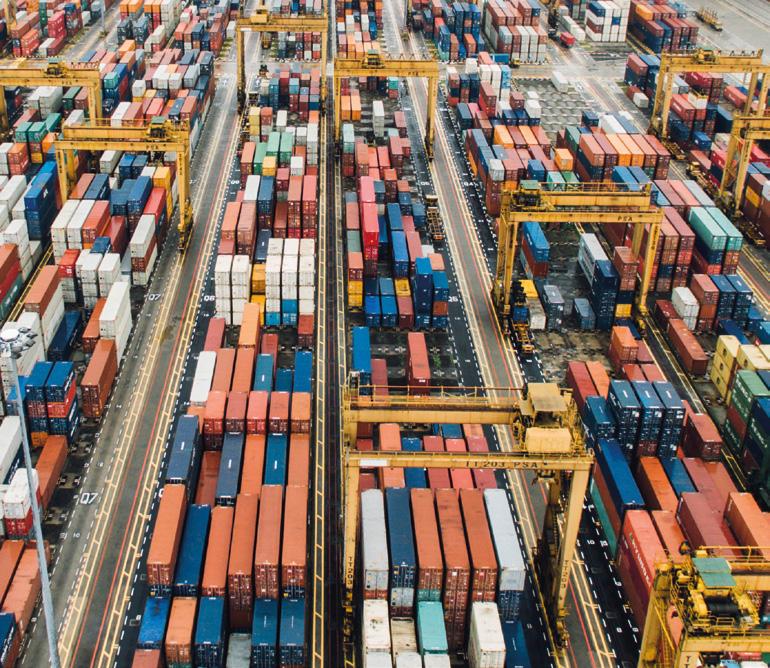
5 minute read
British Chambers of Commerce launches Trade Strategy Manifesto
The past decade has been marked by significant changes in the UK’s position in international trade, including domestic politics and economics, and has also been affected by issues around supply chain sectors, public health and geopolitics.
The UK benefits greatly from open and fair international trade. In 2023, the UK exported £393 billion in goods. In services, it was the second largest exporter in the world, with a trade surplus of £173 billion [BCC trade strategy manifesto].
On supply chains, the UK has adapted to challenges such as the pandemic, conflict and geopolitical concerns. The UK’s strengths are in the financial, intellectual property, business, professional, transport, travel and creative services sectors, as well as making great strides in technological advances in manufactured goods and research developments in Artificial Intelligence.
The British Chambers of Commerce (BCC) has launched its Trade Strategy Manifesto to improve the UK’s supply chain and critical imports security, alongside lasting export growth.
The BCC represents a network of 51 accredited UK Chambers, and over 75 British Chambers in international markets. They are committed to creating a platform for businesses to shape the economy for the better. More than 40 per cent of its member companies export – higher than any other group of UK companies. The BCC firmly believes that “international trade can make every company a better and more productive one”.
In its manifesto, the BCC states: “The UK should implement a bold and decisive Trade Strategy to raise the contribution of net trade and exports to UK GDP growth in the coming years. The UK has real strengths in its capital markets, data flows, and its growing trade in energy, goods, and services with its neighbours and expanding global markets.
“There are huge opportunities for growth, if we secure the right trade and investment deals, improve trade finance access and increase digital trade. We also need smarter regulation, more effective economic diplomacy and better export support. Finally, there should be a goal of building international alliances to support the multilateral rules-based trade order and the overarching principles of open and fair trade.”
The BCC’s policy recommendations are:
Aligning trade and industrial strategies with economic diplomacy
1. To reach the target of £1 trillion in exports by early in the next decade, align industrial and trade strategies - particularly with fast growing sectors including services, high-value manufacturing, industrial and construction products, as well as food and drink.
2. Use the Government’s economic diplomacy strategy to drive a ‘policy coordination’ agenda between the UK and its principal trading partners. This should combine permanent UK Mission diplomats and policy experts within Government.
Imports and supply chains
1. The UK should make critical import and minerals agreements with the EU, South American states - including Chile, and states in Africa, to guarantee long-term supply of critical inputs for advanced UK manufacturing.
2. On trade remedies, we propose close dialogue between the Trade Remedies Authority and industry as trade fragmentation increases globally in 2025.
3. We recommend that the TRA publishes regular data in terms of suspected trade diversion arising from tariff measures on imports applied by other states.
4. WTO rules must be followed on subsidies, and other global conventions and norms on cybersecurity, defence, human and labour rights must be complied with by our trading partners.
Trade agreements and delivering export growth
1. Ensure the Trade Strategy acknowledges the importance of free and fair trade for the UK economy, and consistent and clear principles on policy on tariffs, quotas and subsidies.
2. Conclude a series of agreements, alongside the UK-EU TCA, to reduce cross border red tape, goods movement compliance costs, and the costs of doing trade with the EU. The UK should also propose (for agreement by the EU and other states) rejoining the Pan-Euro-
Mediterranean (PEM) Convention to offer greater cumulation flexibility within rules of origin for manufacturers.
3. Publish preference utilisation rates on key trade agreements. Use these, and HMRC data, to track progress of the use of FTAs UK businesses in a highly targeted way to maximise trade opportunities from FTAs. Make the most of CPTPP accession to expand UK trade in the Asia-Pacific region over the coming decades.
4. Review business engagement, so industry can play a stronger role in getting trade deals done. There is a case for the review of non-disclosure agreements for stakeholders on key trade policy issues. They should be used in a smarter way, so industry can play a stronger role in getting deals done and providing specialist advice. This could work well on issues such as rules of origin, intellectual property, investment protection, mobility, and market access chapters of trade agreements, or in negotiations.
5. Retain and develop the GREAT campaign. Ensure that exporters can obtain necessary guidance and communications on key trade opportunities and developments through the GREAT online platform, as a first port of call. Government should also flag key advice and services on exporting and regulatory compliance through trusted partners, such as the Chamber Network.
6. Enhance the role of HM Trade Commissioners. Support a revitalised Trade Envoy programme, with particular focus on key export markets. These should include the EU, the Americas and LATAC regions, China, Switzerland, Türkiye, the Gulf Co-operation Council states and the CPTPP states.
7. Work with business to ensure export support receives additional funding in the second phase of the spending review, to achieve growth in export volumes over the next five years.

8. Use the increased credit envelope for UKEF, following the Autumn Budget 2024, to grow UK companies’ access to key trading markets and supplies of key minerals and metals, particularly for exports in advanced manufacturing.
A growth strategy for green trade
1. Scale up green exports as a strategic driver of attaining the £1 trillion exports target in the next decade.
2. Achieve stronger integration in Government between industrial strategy, trade, subsidies and export finance policies affecting trade in green goods and services.
3. Earmark sufficient dedicated finance from UK Export Finance’s existing credit lines, to boost exporters access to markets for climate friendly technologies and associated services.
4. Build stronger plurilateral and multilateral coalitions through, for example, the Trade and Environmental Sustainability Structured Discussions (TESSD) at the WTO.
5. Examine the case for upgrading free trade or economic partnership agreements, and opening new negotiations, to enhance market access and investment opportunities where greater availability of green technologies is needed. This should include the African, South American and Asia-Pacific regions.
6. Implement the UK CBAM in partnership with business and negotiate formal linkages with EU CBAM and ETS. Doing this will avoid the creation of new trade barriers with our largest trading partner and provide a stable environment in European energy investment.
Building global alliances on digital trade
1. Build global alliances and step up at the WTO to influence its priorities for the coming years, including digital trade, Intellectual Property rights, data and trade in services.
2. If the Appellate Body cannot be resuscitated as a functioning tribunal over the next five years, the UK should consider joining the EU and 22 other WTO members in the Multi-Party Interim Appeal Adjudication Arrangement (MPIA).
3. Encourage more countries to adopt reforms on digitalisation from the UNCITRAL model law on electronic transferable records, to realise the full benefits of trade document digitalisation for global trade.
4. Reach bilateral digital trade agreements with key partners, particularly where full free trade agreements may not prove possible, such as Brazil and the USA.
5. The UK Government should also work with the EU to put data flow arrangements on a permanent footing in the longer term.
6. Develop the role of the Chamber Network in being a trusted delivery partner in trade facilitation and digitalisation of trade documentation. Evaluate the results of the ATA Carnets digitalisation pilot with London Chamber of Commerce and Industry, and move to permanent digitalisation of ATA Carnets.
Enhancing UK export support
1. We recommend a partnership between the Network and Government, to focus on helping experienced exporters penetrate new markets or deepen access to existing ones.
2. This should also emphasise pragmatic conversations with companies about the benefits of free trade agreements.
3. This partnership should utilise the Chamber network’s existing relationships and strengths – both UK and international.
Read the full report at www.britishchambers.org.uk









